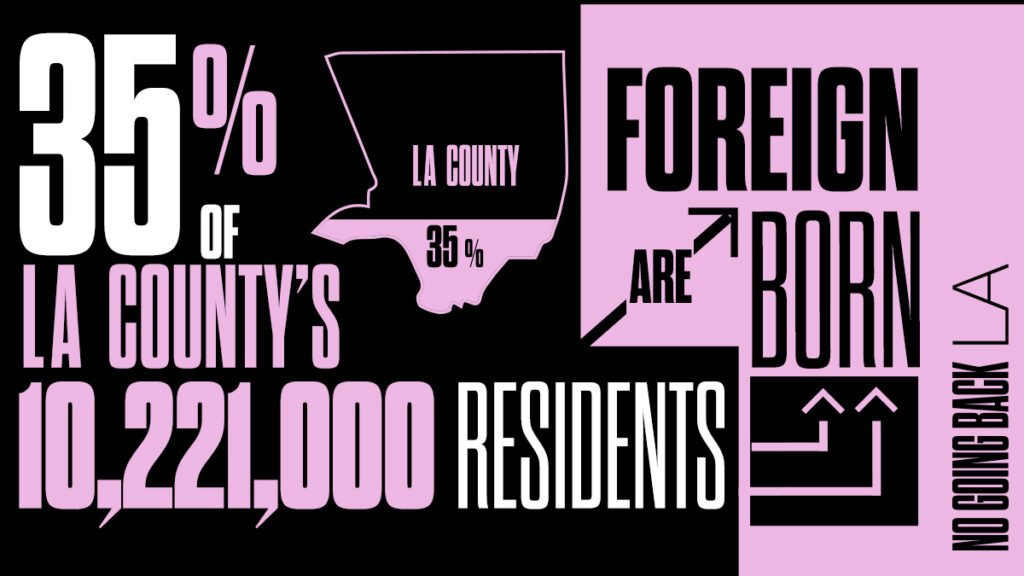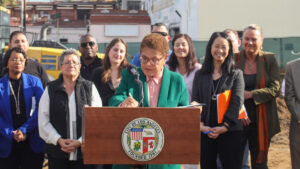The Challenge
When it was founded in 1781, Los Angeles was far from the metropolis we know it as today: it was a tiny settlement built on Tongva and Chumash tribal land by a meagre population of 44—20 of whom were people of colour. Everyone who has come to Los Angeles since has in one form or another been an immigrant. Yet in repeatedly marginalizing our immigrant communities, we are doing a disservice not only to them, but to the rich history of Los Angeles and to the civic, economic, and social good of all Angelenos.
Even prior to last year’s release of the “No Going Back LA” report, Los Angeles wasn’t just a city of immigrants; it is a city of undocumented immigrants. Indeed, undocumented immigrants and their close family members comprise roughly 18 percent of the County. And they are deeply embedded in the community: 70 percent of undocumented Angelenos have been in the United States for over ten years. Undocumented immigrants are an integral part of Los Angeles, and not just because they have raised their families alongside other Angelenos and sent their children to the same schools. Immigrants make up approximately half of the essential workforce in Los Angeles, ensuring that we have access to crucial goods and services—all the more important during COVID-19, during which undocumented immigrants have made up a disproportionate share of essential and frontline workers.

- 12% of LA’s workers are undocumented
- 33% of LA occupations most impacted by COVID are filled by undocumented workers
- 794,000 undocumented residents live in LA County
Despite this role, undocumented immigrants are one of LA’s most isolated and vulnerable populations. The ever-present threat of deportation became even more real for undocumented Angelenos under the aggressively anti-immigrant policies of the Trump Administration—even for those who have been granted temporary status, for instance under DACA. For those 490,000 U.S.-born children in LA County who live with at least one undocumented parent, this means facing an imminent threat of family separation. Beyond the fear of deportation, immigrants are often linguistically isolated. Forty percent of undocumented households have no member of that family that is proficient in English—a fact that far too often both private and public services continue to neglect. The challenge doesn’t just stop there: even among permanent residents and naturalized citizens, linguistic isolation can prove debilitating. Just as importantly, undocumented immigrants must contend with the reality that they are often deliberately cut off from a social safety net not predicated on basic human decency by design.
The devastating economic consequences of the COVID-19 pandemic have brought this reality into even starker focus. Not only were undocumented immigrants structurally excluded from obtaining healthcare insurance—a sobering difficulty during an acute health crisis—they are often also ineligible for federal, state, and local aid. This lack of access can critically endanger the lives and livelihoods of many undocumented immigrants, and particularly immigrant women, who are concentrated in retail trade, leisure, and hospitality. For those employed in key food and janitorial services, ineligibility from relief means that, on a daily basis, they must risk exposing themselves and their families to COVID-19—or miss out on badly-needed income.
The Way Forward
Fortunately, there has been some progress towards recognizing how integral immigrants are to the fabric of Los Angeles over the past year. To alleviate the economic ramifications of COVID-19, California funded stimulus support for those shut out of federal COVID-19 relief, including up to $1,000 for undocumented Californians and their families. In a meaningful step toward equal access, California also expanded Medi-Cal to allow undocumented residents to sign up for health insurance at 50 years of age. This will give approximately 235,000 older Californians greater access to vital health care services.
Los Angeles County eliminated citizenship requirements for most jobs, allowing immigrants with legal status to hold leadership roles and guide policy at one of the region’s largest employers.
We must work to ensure that immigrants have accessibility, mobility, and voice, regardless of status. This means not only ensuring equal access to the same social safety net—especially healthcare, housing, education, and financial relief—but also rooting out discrimination from our communities and businesses, and expanding civic participation to fully include our immigrant communities.



